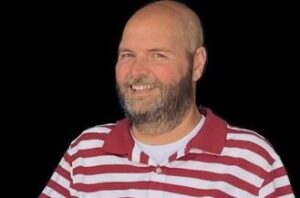Personal Life:
I was born and raised in rural Marion County, Kentucky. After high school, I attended the University of Kentucky in Lexington, KY where I received two Bachelor’s Degrees in Computer Science and Mathematical Science with a minor in Statistics. I’m currently a web designer and developer for The Human Development Institute at the University of Kentucky. I also serve on many non-profit boards which assist the disabled community, including the Adaptive Martial Arts Association.
I was born with Cerebral Palsy and use a walker and motorized wheelchair to get around. After years of renting, I purchased a home in 2013 and enjoy personalizing it. I also enjoy pursuing my passion of martial arts and currently hold the rank of Nidan (2nd Degree Black Belt) in traditional Kenpo Karate.
Martial Arts Training:
As a child of the 1970s and 80s, I grew up watching martial arts shows and movies which got me interested. At that time, training someone with a disability was unheard of. So, my training was solely informal and horrible. I began training myself using books. Looking back, the “training” –if you call it that—was horrible, but I am grateful because it fed my desire. At the age of 31, I began training in traditional Chinese Kenpo after reading a local newspaper article about a local school owner who had a similar disability. Leading me to the school was the lasting benefit of that owner, even though my first lessons were taught in private by the original owner. However, it was not until my new instructor (Master Steve Finn) took over that I felt like I was actually starting achieve my goals. Master Finn made adaptions to techniques, focusing on “What Worked” for me instead taking a “By The Book approach”, while still honoring tradition. This taught me that the right teacher was the key to success. In a future article I will address choosing the right martial art and teacher, as well as appropriate modification protocol.
I began to advance in grade then rank and soon began to integrate into the “Group Class” setting. At first the other students were nervous working with me because I was the only adaptive Martial Artist at the school, but before long I was “Just Another Student” and began teaching others. I have seen many physical and emotional benefits as a result of my training. The Dojo just feels right, I fit in, and I have a sense of accomplishment every time I train. Truly, it is the only place I feel at total peace. Recently, I have started training Kali to add stick and blade to my Kenpo. My biggest obstacle in regards to training is transportation. I don’t drive, so in order to get to the dojo I must either ride my power chair there which takes 45 minutes one way or take a one-way 75 minute city bus ride.
Training Regrets:
When asked if I had any training regrets, my response is constant, “Only that I didn’t start sooner and I didn’t document my journey.”
Advice To Others:
“It may seem strange, but I would not encourage anyone to follow my path. I feel each of us have our own unique path to travel and I encourage those with disabilities to explore your opportunities and not to let their challenges to hold them back!”
Learn more about Darrell’s journey (in English and Korean) in this article from the International Centre of Martial Arts:
2018 ICM INSIGHT_UNESCO ICM_MARTIAL ARTS FOR ALL.pdf (29.09 MB)
2018 ICM INSIGHT_UNESCO ICM_모두를 위한 무예.pdf (29.35 MB)



